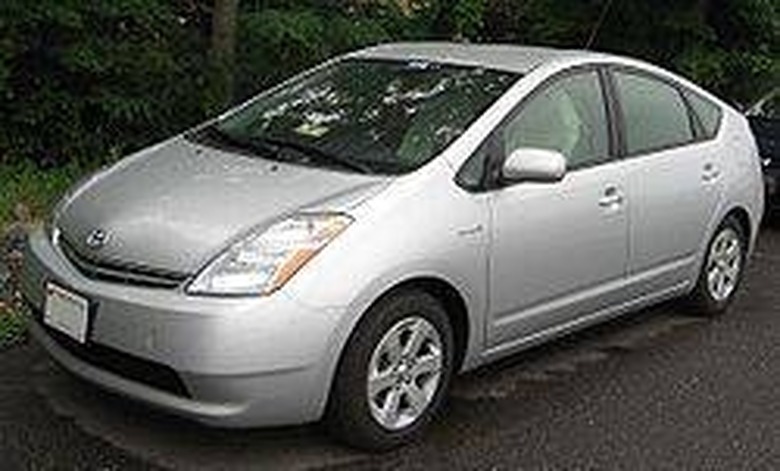Advantages & Disadvantages Of Hybrid Cars
Hybrid cars have become popular over the last several years as our society becomes more mindful of the impact of energy consumption on the environment. As with any technology, hybrid cars have their good and not-so-good points.
Classification and General Features of Hybrid Cars
Classification and General Features of Hybrid Cars
Hybrid cars are vehicles that contain an electric motor along with an internal combustion engine (ICE). There are a few different arrangements of the motor and engine in these vehicles.
The parallel configuration hybrid vehicle has both an internal combustion engine and an electric motor producing propulsive force simultaneously. This means that the engine and motor are both connected to the drivetrain, which turns the car's wheels. For example, the Honda Civic IMA has this configuration.
A series configuration hybrid vehicle has an internal combustion engine supplying an electrical generator that connects to the drivetrain. Diesel-electric trains use a series configuration.
Vehicles that can regenerate charge from being plugged in are called Plug-In Hybrid Electric Vehicles (PHEVs). Certain models of the Toyota Prius have this feature.
A less common type of electric vehicle worth mentioning is the hydrogen fuel cell vehicle. Hydrogen fuel cell vehicles convert stored hydrogen gas to electricity that powers an electric motor. These are considered electric vehicles because they do not depend on gasoline. They can be refueled in around five minutes and have a range of over 300 miles.
Advantages of Hybrid Cars
Advantages of Hybrid Cars
**Regenerative braking:** Vehicles with internal combustion engines rely on friction brakes. The energy created is dissipated as heat. Hybrid vehicles capture and convert a portion of that kinetic energy into stored electric energy in the vehicle's battery.
**Electric motor drive or assist:** The electric motor assists the internal combustion engine in accelerating, passing or climbing a hill.
**Electric-only drive:** This allows the vehicle to be driven entirely with electricity. This typically happens at low speeds, when the engine is idling at a stoplight for instance and when the engine starts up. The internal combustion engine begins to operate only at higher speeds where it is more efficient. This increases the overall fuel efficiency of the vehicle.
**Automatic start/stop:** In hybrid cars, the engine is automatically shut off when the vehicle is idle and started with the accelerator is depressed.
Compared with traditional hybrid vehicles, PHEVs can drive at higher speeds for longer distances. Hydrogen fuel cell vehicles have lower energy emissions because they only emit water vapor and warm air.
**Price:** When hybrid vehicles were first introduced, they were substantially more expensive than ICE vehicles, mainly due to battery price. As of 2019, the cost of hybrid vehicles is comparable to non-hybrid models, according to the U.S. Department of Energy.
Cost differences ranged anywhere from $960 to $4,300 more for the hybrid than the non-hybrid model. The cost difference was made up in fuel efficiency in less than five years for more than half of the models that were compared.
Disadvantages of Hybrid Cars
Disadvantages of Hybrid Cars
**Battery maintenance/replacement:** According to Green Car Reports, battery replacement of hybrid vehicles is currently rare; for example, Toyota considers the NiMH batteries in the Prius to be lifelong. Hybrid taxis with at 300,000+ miles and a Prius with 215,000+ miles demonstrate a barely diminished performance using their original battery.
If a battery does need to be replaced, however, it can get pricey. For instance, the cost to replace a battery for Toyota models from 2003-2015 is between $3,649-$6,353. Toyota includes a core credit, reducing the new battery price by about 1/3, but these prices do not include the cost of labor. Note that batteries that fail within the warranty period should be replaced at no cost to the consumer.
**Battery disposal and recycling:** The goal of recycling is to harvest usable materials for repurposing from batteries that are at the end of their useful life cycle. This removes waste from the environment.
The main issue with recycling lies in the collection rate of vehicle batteries. This is also a problem for lithium batteries in mobile electronics.
Although lithium is 100 percent recyclable, it is not recycled because extracting it costs too much to make it of high economic value. Thus, it is only done because of federal mandates and/or ecological purposes.
**Hydrogen fuel cell disadvantages:** Hydrogen can be sourced from both "clean" sources like solar or wind power or dirty sources such as coal and natural gas. Sourcing from coal and natural gas undermines the ecological motive for use of hydrogen fuel cell vehicles.
Production of hydrogen is also expensive, and the fuel cells require refueling at a hydrogen station. At present, these stations are only located in California and near Toronto.
In summary, the pros and cons of hybrid cars have shifted toward the pros as technology has advanced.
References
- Union of Concerned Scientists: How Do Hybrid Cars and Trucks Work?
- Science Direct: Hybrid Vehicle
- U.S. Department of Energy: Can a Hybrid Save Me Money?
- U.S. Department of Energy: Alternative Fuels Data Center: Fuel Cell Electric Vehicles
- Green Car Reports: Toyota Hybrid Battery Replacement Cost Guide (2016 Update)
Cite This Article
MLA
Mends, Francine. "Advantages & Disadvantages Of Hybrid Cars" sciencing.com, https://www.sciencing.com/advantages-disadvantages-hybrid-cars-4743223/. 29 August 2019.
APA
Mends, Francine. (2019, August 29). Advantages & Disadvantages Of Hybrid Cars. sciencing.com. Retrieved from https://www.sciencing.com/advantages-disadvantages-hybrid-cars-4743223/
Chicago
Mends, Francine. Advantages & Disadvantages Of Hybrid Cars last modified March 24, 2022. https://www.sciencing.com/advantages-disadvantages-hybrid-cars-4743223/
